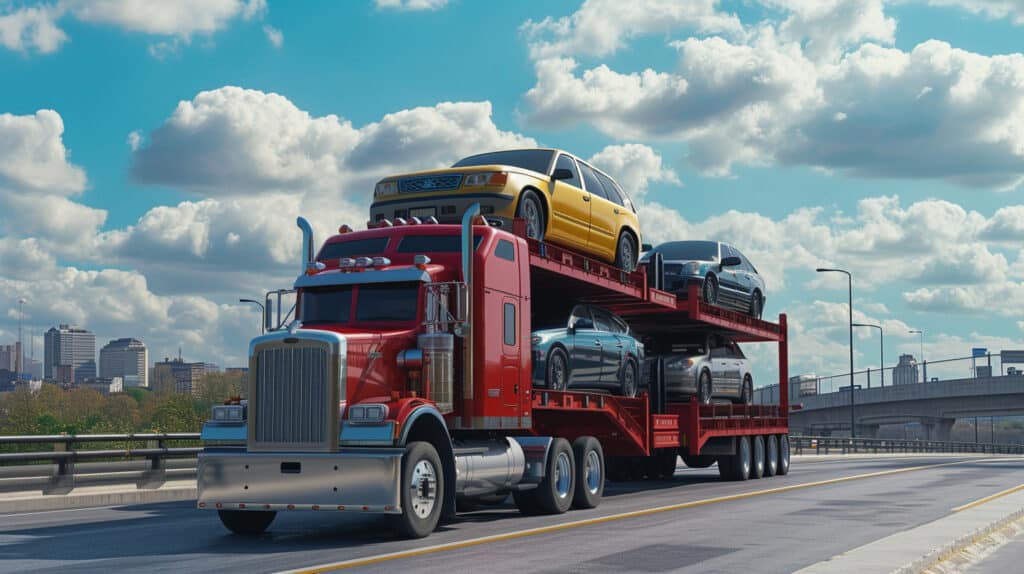When engaging in a cross-country vehicle transport, ensuring its safety is of utmost importance. AA Auto Transport, a trusted name in the industry, understands the significance of a secure journey for your vehicle. From securing your vehicle properly to safeguarding it against various weather conditions, and choosing the right transport equipment, there are several factors to consider for a smooth and damage-free journey.
We’ll explore each aspect, offering valuable insights and practical tips to ensure a secure cross-country transport experience.
Securing Your Vehicle: Tips for Preparing Your Car for a Secure and Damage-Free Transport
- Inspect and Document: Before handing over your vehicle to the transport company, conduct a thorough inspection of its current condition. Take note of any existing damages and document them with photographs. This will serve as a reference point in case any issues arise during transport.
- Remove Personal Items: Clear out all personal belongings from your vehicle. Items left inside can become projectiles during transport, potentially causing damage to the interior or even the vehicle itself. Ensure that your car is empty, excluding necessary items like spare tires and jacks.
- Disable Alarm Systems: Disable any alarm systems or anti-theft devices in your vehicle. This prevents unnecessary disturbances during transport and ensures a smoother process for both you and the transport company.
- Check Fluid Levels: Ensure that all fluid levels in your vehicle, including oil, coolant, and brake fluid, are at the recommended levels. This helps in maintaining the optimal functioning of your car during transport.
- Secure Loose Parts: Check for any loose parts or accessories on your vehicle, such as side mirrors, antennas, or convertible tops. Secure these items or remove them if necessary to prevent potential damage during transit.
- Fold In Mirrors: To avoid the risk of mirrors getting damaged during transport, fold them in and secure them properly. This simple step can prevent unnecessary wear and tear on your vehicle.
- Maintain Adequate Tire Pressure: Properly inflated tires are crucial for the safety of your vehicle during transport. Check and maintain the recommended tire pressure to ensure a smooth journey and prevent any tire damage.
Weather-Related Precautions: Protecting Your Vehicle Against the Elements During Transit

- Check Weather Forecasts: Stay informed about the weather conditions along your vehicle’s route. If adverse weather is expected, communicate with the transport company to discuss potential delays or alternative routes.
- Use Car Covers: Invest in a high-quality car cover to protect your vehicle from rain, snow, and other environmental elements. A snug-fitting cover can shield your car’s exterior and minimize the risk of damage.
- Apply Wax: Before transport, apply a layer of wax to your vehicle’s exterior. This adds an extra layer of protection against rain, snow, and road debris, helping to maintain the paint and finish.
- Install Windshield Protectors: To safeguard against potential cracks or chips, install windshield protectors. These transparent shields act as a barrier, reducing the impact of debris kicked up during transit.
- Secure Windows and Seals: Ensure that all windows are tightly closed and sealed to prevent water leaks. This simple step can protect the interior of your vehicle from water damage during transport.
- Consider Enclosed Transport: If your vehicle is a classic car or particularly valuable, consider opting for enclosed transport. This provides an additional layer of protection against weather conditions and road debris.
- Emergency Kit: Prepare an emergency kit for your vehicle, including basic tools, a flashlight, and essential fluids. In case of unexpected weather challenges, having these items on hand can prove invaluable.
Quality Transport Equipment: Ensuring the Use of Reliable and Secure Transport Trailers
- Research Transport Companies: Before selecting a transport company, thoroughly research and read reviews. Choose a reputable company with a track record of secure and damage-free vehicle transport. Consider AA Auto Transport as a reliable provider.
- Verify Insurance Coverage: Ensure that the transport company has adequate insurance coverage for your vehicle. Request and verify their insurance policy to guarantee compensation in case of any unforeseen damages during transit.
- Trailer Inspection: Inspect the transport trailer that will carry your vehicle. Check for any signs of damage, rust, or structural issues. A well-maintained trailer is crucial for a safe and secure journey.
- Tie-Down Points: Confirm that the transport trailer has sufficient and strategically placed tie-down points. These anchor points ensure that your vehicle is securely fastened and prevents any movement during transit.
- Enclosed vs. Open Trailers: Assess the type of trailer suitable for your vehicle. While open trailers are more common and cost-effective, enclosed trailers provide an extra layer of protection against the elements and potential road debris.
- Loading and Unloading Procedures: Inquire about the loading and unloading procedures employed by the transport company. Professional loading and unloading techniques minimize the risk of damage to your vehicle during these critical stages.
- Communication: Maintain open communication with the transport company throughout the process. Stay informed about the progress of your vehicle, and promptly address any concerns or issues that may arise during transport.
Conclusion
By implementing these comprehensive measures, with the support of AA Auto Transport, you can significantly enhance the safety of your vehicle during cross-country vehicle transport. Each step plays a crucial role in ensuring a secure and damage-free journey.
Prioritize thorough preparation, choose a reputable transport company like AA Auto Transport, and stay proactive in safeguarding your vehicle for a stress-free cross-country transport experience. Trust in the expertise of AA Auto Transport to make your vehicle’s journey as smooth and secure as possible.

